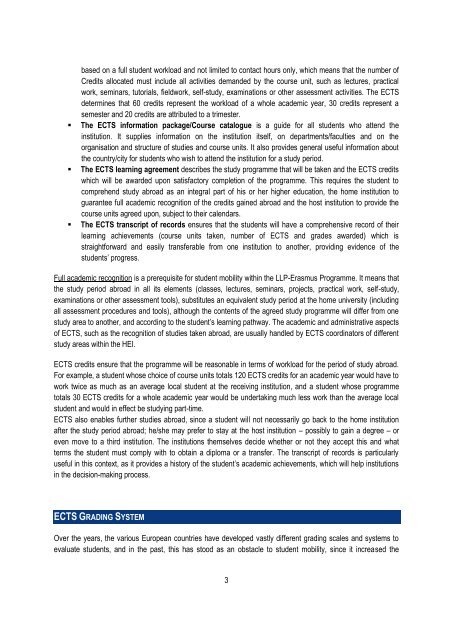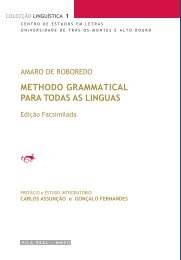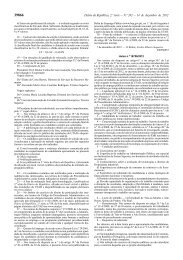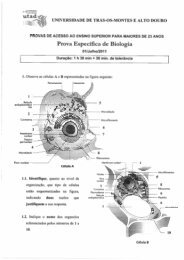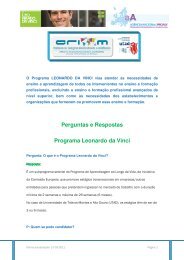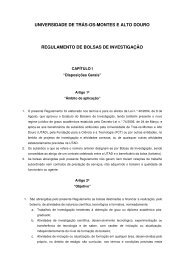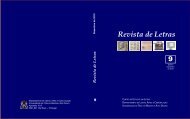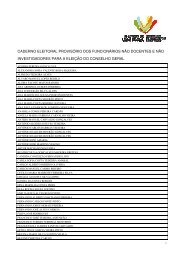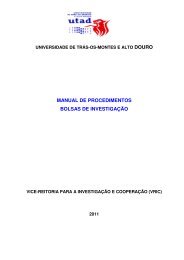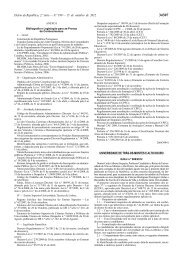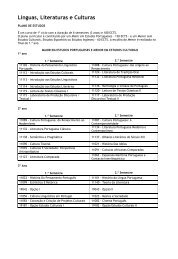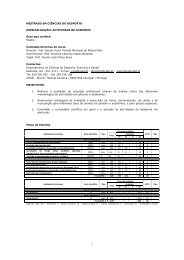ECTS at UTAD
ECTS at UTAD
ECTS at UTAD
You also want an ePaper? Increase the reach of your titles
YUMPU automatically turns print PDFs into web optimized ePapers that Google loves.
ased on a full student workload and not limited to contact hours only, which means th<strong>at</strong> the number of<br />
Credits alloc<strong>at</strong>ed must include all activities demanded by the course unit, such as lectures, practical<br />
work, seminars, tutorials, fieldwork, self-study, examin<strong>at</strong>ions or other assessment activities. The <strong>ECTS</strong><br />
determines th<strong>at</strong> 60 credits represent the workload of a whole academic year, 30 credits represent a<br />
semester and 20 credits are <strong>at</strong>tributed to a trimester.<br />
• The <strong>ECTS</strong> inform<strong>at</strong>ion package/Course c<strong>at</strong>alogue is a guide for all students who <strong>at</strong>tend the<br />
institution. It supplies inform<strong>at</strong>ion on the institution itself, on departments/faculties and on the<br />
organis<strong>at</strong>ion and structure of studies and course units. It also provides general useful inform<strong>at</strong>ion about<br />
the country/city for students who wish to <strong>at</strong>tend the institution for a study period.<br />
• The <strong>ECTS</strong> learning agreement describes the study programme th<strong>at</strong> will be taken and the <strong>ECTS</strong> credits<br />
which will be awarded upon s<strong>at</strong>isfactory completion of the programme. This requires the student to<br />
comprehend study abroad as an integral part of his or her higher educ<strong>at</strong>ion, the home institution to<br />
guarantee full academic recognition of the credits gained abroad and the host institution to provide the<br />
course units agreed upon, subject to their calendars.<br />
• The <strong>ECTS</strong> transcript of records ensures th<strong>at</strong> the students will have a comprehensive record of their<br />
learning achievements (course units taken, number of <strong>ECTS</strong> and grades awarded) which is<br />
straightforward and easily transferable from one institution to another, providing evidence of the<br />
students’ progress.<br />
Full academic recognition is a prerequisite for student mobility within the LLP-Erasmus Programme. It means th<strong>at</strong><br />
the study period abroad in all its elements (classes, lectures, seminars, projects, practical work, self-study,<br />
examin<strong>at</strong>ions or other assessment tools), substitutes an equivalent study period <strong>at</strong> the home university (including<br />
all assessment procedures and tools), although the contents of the agreed study programme will differ from one<br />
study area to another, and according to the student’s learning p<strong>at</strong>hway. The academic and administr<strong>at</strong>ive aspects<br />
of <strong>ECTS</strong>, such as the recognition of studies taken abroad, are usually handled by <strong>ECTS</strong> coordin<strong>at</strong>ors of different<br />
study areas within the HEI.<br />
<strong>ECTS</strong> credits ensure th<strong>at</strong> the programme will be reasonable in terms of workload for the period of study abroad.<br />
For example, a student whose choice of course units totals 120 <strong>ECTS</strong> credits for an academic year would have to<br />
work twice as much as an average local student <strong>at</strong> the receiving institution, and a student whose programme<br />
totals 30 <strong>ECTS</strong> credits for a whole academic year would be undertaking much less work than the average local<br />
student and would in effect be studying part-time.<br />
<strong>ECTS</strong> also enables further studies abroad, since a student will not necessarily go back to the home institution<br />
after the study period abroad; he/she may prefer to stay <strong>at</strong> the host institution – possibly to gain a degree – or<br />
even move to a third institution. The institutions themselves decide whether or not they accept this and wh<strong>at</strong><br />
terms the student must comply with to obtain a diploma or a transfer. The transcript of records is particularly<br />
useful in this context, as it provides a history of the student’s academic achievements, which will help institutions<br />
in the decision-making process.<br />
<strong>ECTS</strong> GRADING SYSTEM<br />
Over the years, the various European countries have developed vastly different grading scales and systems to<br />
evalu<strong>at</strong>e students, and in the past, this has stood as an obstacle to student mobility, since it increased the<br />
3


